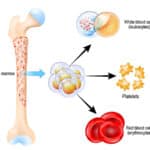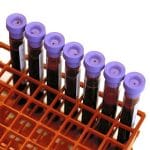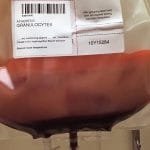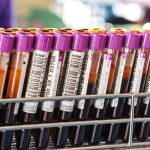Platelet transfusion decisions are too important to be made by looking at just one number. Joe Sweeney wants to show you a better way!
NOTE: Continuing Education credit for this episode has expired. See below for details.

Dr. Joe Sweeney
Better Information Means Better Decisions
Platelet transfusion decisions can be complex, and there is wide practice variability both within institutions and among different subspecialty services. In this wide-ranging, very practical interview, Dr. Sweeney describes current platelet transfusion guidelines and a more thorough approach to caring for thrombocytopenic patients. More importantly, he helps us understand the questions we should be asking, whether we are in charge of transfusing a patient or reviewing someone else’s transfusion decisions.

Dr. Joe Sweeney
Better Information Means Better Decisions
Platelet transfusion decisions can be complex, and there is wide practice variability both within institutions and among different subspecialty services. In this wide-ranging, very practical interview, Dr. Sweeney describes current platelet transfusion guidelines and a more thorough approach to caring for thrombocytopenic patients. More importantly, he helps us understand the questions we should be asking, whether we are in charge of transfusing a patient or reviewing someone else’s transfusion decisions.
I think it’s really important as we try to manage all blood components to shift transfusion culture, and part of that is talking to our colleagues, not the morning of the procedure when it becomes a bit of an emergency, but actually long in advance of that, you know, weeks or months in advance to go to their meetings and to talk to them about these issues and that helps a lot. It may not solve every problem, but it helps in many, many situations.
About My Guest:
Dr. Joseph Sweeney received his Medical Degree from the National University of Ireland and trained in Internal Medicine and Hematology in Dublin, Ireland. He subsequently trained in New York in Clinical Hematology, Blood Banking and Medical Oncology. He is a former Medical Director of the Hemophilia Center and Medical Director of the Blood Bank at Roswell Park Cancer Center in Buffalo and former Chief Medical Officer and Head of Research at the American Red Cross in Norfolk, Virginia. He is now Professor of Pathology and Laboratory Medicine and Director of Transfusion Medicine and Coagulation at Brown University.
Dr Sweeney is Board Certified in Internal Medicine, Hematology and Blood Banking. He is a Fellow of the American College of Physicians; a Fellow of the Royal College of Pathologists (UK) and a Fellow of the Royal College of Physicians of Ireland in the Faculty of Pathology. Dr. Sweeney has extensive experience and expertise in Transfusion Medicine: He has edited two books, written several book chapters and over 230 scientific papers and abstracts. He has served as a member of the Technical Committee of the AABB, and currently serves on the editorial board of Transfusion, and is a reviewer for several Journals including the American Journal of Clinical Pathology and Vox Sanguinis.
Continuing Education Expired
This podcast episode offered continuing education credit for two years from its release date, but is no longer eligible for such credit.
To find Blood Bank Guy Essentials Podcast episodes with active continuing education opportunities, Click here or visit Transfusion News Continuing Education on Wiley Health Learning.
DISCLAIMER: The opinions expressed on this episode are those of my guest and I alone, and do not reflect those of the organizations with which either of us is affiliated. Neither Dr. Sweeney nor I have any relevant financial disclosures.
Further Reading:
- Gaydos LA et al. The Quantitative Relation between Platelet Count and Hemorrhage in Patients with Acute Leukemia. N Engl J Med 1962;266:905-909
- Kaufman RM et al. Platelet Transfusion: A Clinical Practice Guideline from the AABB Platelet Transfusion: A Clinical Practice Guideline From the AABB. Ann Intern Med 2015;162(3):205-213
- Schiffer CA et al. Platelet Transfusion for Patients With Cancer: American Society of Clinical Oncology Practice Guideline Update. J Clin Oncol 2018;36(3):283-299
- Gehrie EA et al. One-unit compared to two-unit transfusions for adult oncology outpatients. Vox Sanguinis 2019;114:517-522
- Wallace MJ et al. Transjugular Liver Biopsy in Patients with Hematologic Malignancy and Severe Thrombocytopenia. J Vasc Interv Radiol 2003;14:323-327
- Patel IJ et al. Society of Interventional Radiology Consensus Guidelines for the Periprocedural Management of Thrombotic and Bleeding Risk in Patients Undergoing Percutaneous Image-Guided Interventions—Part II: Recommendations. J Vasc Interv Radiol 2019;30:1168-1184
- Baharoglu MI et al. Platelet transfusion versus standard care after acute stroke due to spontaneous cerebral haemorrhage associated with antiplatelet therapy (PATCH): a randomised, open-label, phase 3 trial. Lancet 2016;25:2605-2613
Thanks to:
- Dr. Daniela Hermelin, Assistant Editor; Follow Daniela on Twitter for fantastic #blooducation!
- Samantha Chaffin, Design and content consultant
Music Credit
Music for this episode includes “Cuando te invade el temor” and “Reflejo,” both by Mar Virtual via the Free Music Archive. Click the image below for permissions and license details.














Great discussion! I found the discussion regarding the risk of liver biopsy being greater when done for masses rather than to diagnosis hepatitis or cirrhosis fascinating. Do we think that elevated levels of vWF and/or reduced levels of ADAMTS13 seen in cirrhosis have anything to do with this dichotomy? Or is there some other theory for why these two groups behave differently?
In the NEJM study by Afdhal et al, they found that use of the TPO mimetic eltrombopag was associated with increased risk of portal vein thrombosis when given to cirrhotics with thrombocytopenia prior to invasive procedures. Is there any literature that would shed light on whether increasing platelet counts through transfusion may lead to a similar increased risk of thrombotic events?
Thanks again for a great discussion!
Jeannie Callum addressed some of these questions in her excellent interview, Transfusion in Liver Disease (episode 056). Check that out for some of the answers to the questions you’ve asked.
-Joe